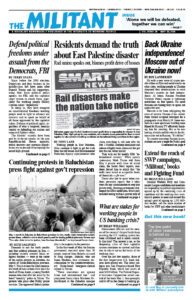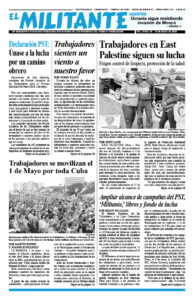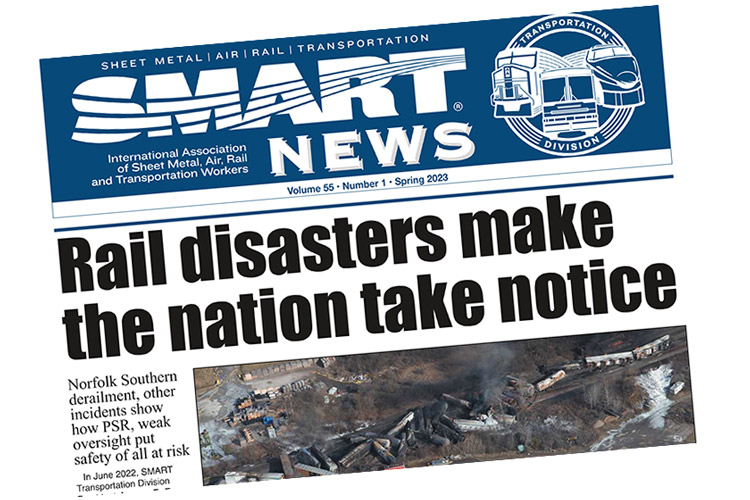Working people in East Palestine, Ohio, continue to fight to get the truth from the rail bosses and Environmental Protection Agency representatives who claim everything is safe now after the Feb. 3 Norfolk Southern derailment and release of highly toxic chemicals that got into the soil, water and air.
They turn out for weekly EPA “informational sessions.” When agency spokesman Mark Durno told them May 4 private wells have all tested clean, the Salem News reports, residents forced him to admit that “the wells have tested at acceptable levels of chemicals — for now.”
Durno also had to agree when residents presented reports that it takes years for any contamination to seep into private wells. Meeting participants challenged the EPA’s initial plan, which only included testing within a quarter mile of the site. Under pressure, the area being tested was expanded, but officials say that is as far as they’ll go. EPA representatives told the meeting anyone outside that area would have to pay for private testing themselves.
While two toxic compounds were detected in earlier samples, Durno said they no longer screen for either chemical. While the EPA initially tested for 180 compounds, he said, the list has been cut to 29.
Several residents pointed to urinalysis tests they had taken that show vinyl chloride residue. Durno doubled down on the agency’s insistence any positive reading can’t be connected to the derailment.
From sessions like this, working people here have growing distrust in the government’s claims and are more determined than ever to press for the truth and force comprehensive action. The next EPA meeting is set for May 11.
Rail union speaks out
The fight being waged in East Palestine got a boost from the latest issue of SMART News, the quarterly put out by the Sheet Metal, Air, Rail and Transportation Workers — Transportation Division. SMART-TD is the largest rail union, with over 36,000 members.
“Rail disasters make the nation take notice,” the headline says. It describes how the rail bosses “continued to prioritize profits above safety,” and “on Feb. 3, 2023, it all exploded.”
“Thirty-eight cars from a Norfolk Southern train, including 11 carrying hazardous materials, left the tracks in East Palestine, Ohio. Toxic chemicals being carried by tanker cars were released,” the union said. “Soil was contaminated and chemical-laden smoke permeated the area after a ‘controlled release’ by NS days after the derailment, extending across the border into Pennsylvania. The disaster left people in the region to contend with concerns about their long-term health and the environmental impacts of the accident from that day forward.”
“Each subsequent derailment (a labor tally of media reports shows at least 37 have happened since) brings up the specter of East Palestine and the question from anyone living near or who encounter rail tracks — am I safe and what can be done to make things safer?”
“By speaking out and supporting efforts to hold the nation’s rail carriers accountable,” the union concludes, “we do our part to keep what happened in East Palestine from happening again.”
The rail unions getting more involved in this fight is important. The conditions rail bosses have created in their drive to maximize profits are the source of the problem. Workers toil with irregular schedules, overly long hours, on crews that are too small, on equipment without enough workers, hauling wildly overlong, heavy trains, often carrying toxic cargo in every kind of weather.
The operating principles of the rail bosses, which most call Precision Scheduled Railroading, were crafted to result in the conditions rail workers face. This has made them, and their investors, a tidy sum.
This new issue of the SMART-TD paper carries a full-page list of what the seven Class 1 railroads in the U.S. are raking in. Norfolk Southern took in $3.3 billion in profits in 2022. BNSF got $5.95 billion; Canadian National, $3.8 billion; CSX, $4.17 billion; Kansas City Southern, $982 million; Canadian Pacific, $2.6 billion; and bosses at Union Pacific cleared a whopping $7 billion. That’s a total of $27.8 billion in profits!
Just as the residents of East Palestine are fighting for maximum control over the cleanup of their town and for lifelong health care for everyone in the region paid for by Norfolk Southern, rail workers are looking for how to gain union control over the conditions and procedures they work under, to put human needs over profits.
Workers control over the rails
“I explain we need to use our union to fight for trains that are limited to no more than 50 cars, with a full crew of four — two on the engine and two in the rear of the train, with a strict limit of eight hours on the job,” retired rail worker Joe Swanson from Lincoln, Nebraska, told the Militant.
“Liberals and others argue we need more federal regulations and ‘friends of labor’ in Congress to exert pressure,” Swanson said. “But our experience — including when President Joseph Biden and a bipartisan Congress voted to deny us the right to strike and imposed a contract that a majority of rail workers had voted against last fall — shows we are the only ones we can depend on to preserve our safety and job conditions. That’s why we need to fight for workers control and to look to forming our own party, a labor party based on our unions.”
Without workers gaining control, derailments continue. Six cars on a Canadian National train derailed May 5 in Kingston, Ontario. Two of the derailed cars fell into the Little Cataraqui Creek, part of a marshland conservation area. One, loaded with adipic acid, began leaking, but the railroad said it was controlled. Other cars that ran off the rails contained a far more toxic chemical, hexamethlenediamine, which luckily didn’t bust out.
Unions fight for sick days
Unions representing workers on the Class 1 railroads are still fighting to win sick days, which the bosses refused to grant in the contract imposed by the government. They have succeeded in a few cases.
But the Brotherhood of Locomotive Engineers and Trainmen union explains the rail bosses are still asking for too many other concessions in return for sick days, instead of just providing what workers are entitled to. “They want to take the money out of our pocket somewhere else and give it back to us in the form of sick time,” said Rob Cunningham, one of the BLET’s general chairmen.
Even on railroads that have offered engineers sick time, bosses still intend to write up workers who take time off under anti-worker attendance policies.
“We’re going to have locomotive engineers and conductors making a choice of whether to work sick and handle some of the most dangerous items that any transportation group handles, but they’re going to work sick or be subject to attendance policies,” said Mark Wallace, BLET’s second-highest official.
The Brotherhood of Maintenance of Way Employees, which represents track maintenance workers, reports the union has been able to reach sick time deals with Union Pacific, CSX and Norfolk Southern, but they had to beat back boss demands for other concessions.


